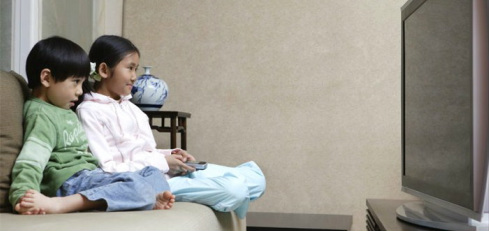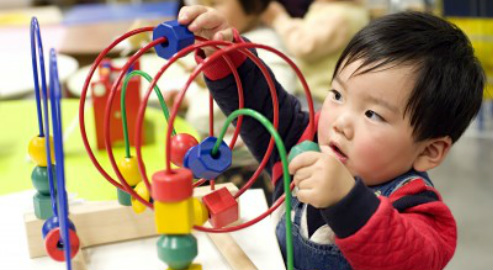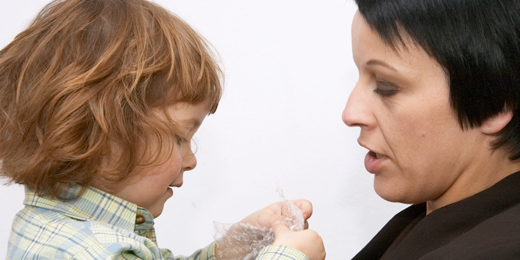|
Whenever you hear of a man doing a great thing, you may be sure that behind it somewhere is a great background. It may be a mother’s training, a father’s example, a teacher’s influence, or an intense experience of his own, but it has to be there or else the great achievement does not come, no matter how favorable the opportunity.
--- Catherine Miles *** The London Times reports: Fathers who devote time to their sons—even as little as five minutes a day—are giving them a far greater chance to grow up as confident adults, a parenting research project has found. Boys who feel that their fathers devote time especially to them and talk about their worries, schoolwork, and social lives almost all emerge as motivated and optimistic young men full of confidence and hope. The study, from the “Tomorrow’s Men” project supported by Oxford University and funded by “Top Man” picked out youngsters with high self-esteem, happiness, and confidence as successful "can-do"” kids. The study found little difference between the positive effects of a good relationship with a father in a standard two-parent family and with an absent father who nevertheless made the effort to make time for the family. “Whatever the shape or form of a family, if you can get it together it makes a difference.” Families who spent significant amounts of time together as a unit were also more likely to turn out confident children. *** Prayers of Parents May we so live that all our children will be able to acquire our best virtues and to leave behind our worst failings. May we pass on the light of courage and compassion, and the questing spirit; and may that light burn more brightly in these our children than it has in us. —Robert Marshall *** Build me a son, O Lord, who will be strong enough to know when he is weak, and brave enough to face himself when he is afraid; one who will be proud and unbending in honest defeat, and humble and gentle in victory. Build me a son whose wishes will not take the place of deeds; a son who will know Thee—and that in Thee is the foundation stone of knowledge. Lead him, I pray, not in the path of ease and comfort but under the stress and spur of difficulties and challenge. Here let him learn to stand up in the storm; here let him learn compassion for those who fail. Build me a son whose heart will be clear, whose goal will be high, a son who will master himself before he seeks to master other men; one who will reach into the future, yet never forget the past. And after all these things are his, add, I pray, enough sense of humor, so that he may always be serious, yet never take himself too seriously. Give him humility, so that he may always remember the simplicity of true greatness, the open mind of true wisdom, and the weakness of true strength. Then I, his father, will dare to whisper, “I have not lived in vain.” —General Douglas MacArthur
0 Comments
My children are at the age that watching TV or movies is one of their favorite activities. The problem is that nearly everything they want to watch has some attitudes, language, or behavior that I don’t approve of. It also seems that these negative aspects are what my children remember most and tend to copy. How can I protect my children from that? Many parents today share the same concern. They realize the importance of monitoring and sometimes restricting what their children view and listen to, and certainly it is their right and responsibility to do so. At the same time, it is virtually impossible for parents to shield their children from every negative influence that comes their way. If the children don’t get exposed to these things via TV, movies, and computer games, they will through their peers or other avenues. You can’t always protect your children from the negative, but you can counter it. Here’s how: Make it a practice to watch with your children and to discuss the show with them afterwards, with the goal of helping them get the most positive and the least negative from the experience. This also gives you an opportunity to discuss problem attitudes or behavior from a third-party perspective—”What do you think that character should have done in that situation?” Over time, this will help your children form strong personal values, as well as teach them to be more selective in what they watch. It’s important to preview the material whenever possible, or at least read the reviews on it so you are aware of the content. This gives you a chance to make sure it is age-appropriate and otherwise suitable for your children. It also gives you time to think about what lessons or information can be gained. Think in terms of, “How can this benefit my children?” If you draw a blank, it’s probably not worthwhile for your children to watch. Gear both viewing and discussion to the age of the children. Videos have an advantage over “live” TV in that you can pause to answer their questions. So if you can, record shows and then show them to your kids later. (That way you can also skip the commercials, which pitch some products you may feel would not be good for your children.) If young children are going to be scared or not understand certain parts, then stop and explain or fast-forward. Older children usually prefer to watch the movie straight through and have the discussion afterwards. In your discussion, the objective is to get the children to think about what they have just watched, and to help them arrive at more mature conclusions than they would on their own. Children learn better by asking questions and thinking things through than they do when all the answers are supplied too quickly. Also, they tend to more readily accept guidance when it comes in the form of answers to their questions or thought-provoking questions that you put to them, than they do when they feel they are being “preached to.” As you watch, you may also want to make note of points that you could use as springboards for more fun, positive, educational interaction with your children, such as reading more about historical figures, places, events, or activities depicted in the show, or taking them for an outing that somehow relates to the show. You just might be surprised at how much your children can benefit from movies and documentaries with a little guidance. They can learn about life and human nature; they can learn how to deal with crises and hardships; they can learn to empathize; they can see that bad choices have consequences, and thus learn from others’ mistakes. So while potentially harmful if not properly channeled, movies and TV can actually be a good teaching tool and bring your family closer together if used selectively. Excerpted from Activated magazine. Used with permission.
One of the most important things you can do to give your children a good foundation in life is to help them establish a personal relationship with God, through Jesus. Children need to know that they are special to God. They need to learn that no matter what, Jesus loves them and will always be there for them. When your children are young, it is very easy to lead them to receive Jesus as their Savior. Once they have Jesus, they will learn to love and more easily understand His Words.
Children can pray and receive God’s gift of eternal salvation, through asking Jesus to come into their hearts, at an early age. You can hardly find anybody more sincere or believing than a small child. That’s why Jesus said we must become as little children to go to Heaven (Matthew 18:3). As soon as they are old enough to pray the simplest of prayers, they are old enough to receive Jesus. As soon as you have taught your child who Jesus is (children’s picture Bibles are great for this), you can explain: “Jesus wants to come and live in your heart. He loves you very much, and He wants to be your best friend and stay with you always. If you ask Him to, He will come and live in your heart. Then He will never ever leave you! Do you want Jesus to come into your heart?” You can then pray a simple prayer that your child can repeat after you, best he or she can. Even if your child is very young and can only manage to say the last word or two from each phrase, that’s enough for Jesus because it’s the heart that counts. Simply pray: “Dear Jesus, please come into my heart. I believe in You and want to love You like You love me. Please forgive my sins, and give me Your gift of eternal life. Amen.” And Jesus will come in; your child will be eternally saved. That is God’s promise (Revelation 3:20; Romans 10:13). Older children may need a fuller explanation of salvation, like the following: “We all have weaknesses and are not perfect, and sometimes we do wrong things that separate us from God. But God loves us so much that He wants to forgive us and help us change. He has worked a great miracle—a plan to save us—and He made it so simple that anyone can be saved. All you need to do is receive Jesus into your heart. When Jesus comes into your life, He will help you right now, and He will also give you eternal life forever in Heaven. Salvation is a great gift from God to all those who love and believe in Jesus. God wants everyone to be saved, but He gives everyone the freedom of choice. Each of us must decide personally if we will accept Jesus and His gift of eternal life.” It’s a wonderful experience for parents to be able to share in their child’s discovery of Jesus and His salvation. Excerpted from "Feed My Lambs: A Guide for Parents and Teachers" by Derek and Michelle Brookes. © Aurora Productions. “Miserable!” That was the only way to describe how I was feeling that day. My husband had had to travel—again!—and there I was alone with our four children. Finances were low, my health was bad, and my teenage daughter was going through a crisis. I prayed—oh, how I prayed!—that Jesus would make things a little easier to bear. Looking out my window at a grove of trees swaying in the gentle breeze, I noticed a little squirrel, squeaking away as he climbed up and down the trees, seemingly without a care in the world. I envied the little fellow. My squirrel chose that moment to change tactics. Instead of running up and down the trees, he started hopping from one tree to the next. He jumped over to the last tree in the cluster, and then looked at one more tree that stood apart from the others. He seemed to be deliberating. I mentally measured the distance between the squirrel and that tree, and it seemed two or three times as far as he had been jumping. Here was a massive challenge. “You can’t be serious, little fellow!” I muttered. But he wasn’t looking for my advice. He ran the length of the branch a few times, squealing frantically. Then he stopped and eyed the distance once more, crouched, and leaped. I wanted to turn my eyes away. Surely this was going to end badly! But no! He flew across that immense span and landed in the other tree with the grace and glory that come from knowing one is meant to perform such feats. He chattered in victory and scampered farther up the tree, as if to his reward. I knew then what had been missing. I had been so busy looking at my problems—measuring the distance between the trees—that I was afraid to let go and sail to the other side. I had lost my faith in my maker, my Savior, my best friend. As I watched the squirrel, now merrily chattering away in the treetop, I knew that Jesus had answered my prayer—not through a spectacular miracle, but rather the example of a happy little squirrel. The same God who took care of him was going to take care of me. Excerpted from Activated magazine. Used with permission. To children, no one in the whole world is more beautiful than their own loving mothers. Young children don’t think of their mothers in terms of fashion sense, great taste in jewelry, or perfect hair and nails. They also don’t notice stretch marks or gray hairs. Their little minds are oblivious to those things that tend to skew adults’ perceptions and expectations regarding beauty, so they’re actually better judges of what makes a woman truly beautiful. Where do children find beauty?—In the eyes that convey pride in their achievements, in the lips that encourage and instruct, in the kisses that make small hurts bearable, in the soothing voice that puts them back to sleep after a bad dream, in the wrap-around love of a soft warm hug. Where does such beauty come from?—With motherhood comes self-sacrifice, but from self-sacrifice comes humility, from humility comes grace, and from grace comes true beauty. A mother embodies life, love, and purity in the giving of herself to her children, and in these she is a reflection of God’s love for His children. This is why I believe that nothing makes a woman more beautiful than motherhood. -- Saskia Smith The Hand that Rocks the Cradle Rules the World What an important job a mother has! The mothers of the next generation are the ones who are molding the future. Motherhood is just about the greatest calling in the world. Of course, taking care of a baby may not always seem very important, but don’t ever minimize it. Who knows what an impact that child may have on the lives of many others one day. The thing that makes a mother so wonderful is her self-sacrificial spirit that is willing to sacrifice her time and strength and even her own health, if necessary, for the sake of that child. Any woman can have a baby, but it takes a real mother to learn how to “train up a child in the way he should go” (Proverbs 22:6). —D.B. Berg Excerpted from Activated Magazine. Used with permission. The Chinese have traditionally counted a baby as one year old when he or she is born, and they have a point. The baby has already been alive before birth, and what has changed is merely the baby’s environment. Thanks to pioneering medical imaging technology, such as 4D ultrasound, we can watch a fetus as it sucks its thumb, blinks, yawns, smiles, and moves inside the womb, leaving no question that it is a unique living soul before birth. --Abi F. May * Imagine yourself as the world’s tallest skyscraper, built in nine months and germinating from a single brick. As that brick divides, it gives rise to every other type of material needed to construct and operate the finished tower—a million tons of steel, concrete, mortar, insulation, tile, wood, granite, solvents, carpet, cable, pipe, and glass, as well as all furniture, phone systems, heating and cooling units, plumbing, electrical wiring, artwork, and computer networks, including software. --Alexander Tsiaras and Barry Werth, From Conception to Birth: A Life Unfolds * Science has its explanations for how children come into being, but when you first hold your baby and look into those little eyes, you know that you are holding a miracle. You are looking at one of the great mysteries of the universe—a glimpse of Heaven and the creative power of God. There in your arms is tangible proof of the love God has for you, for He has chosen you to parent a new soul.--Derek and Michelle Brookes, Keys to Baby * There is a miracle beyond my comprehension, one that takes place daily. A sperm joins with an egg to form a single cell, smaller than a grain of salt. This one cell contains the complex genetic blueprint for every detail of human development, including the child’s gender, hair and eye color, height, skin tone, and much more. Within four days, the fertilized egg has traveled into the womb. At three weeks, the foundations of the brain, spinal cord, and nervous system are established, and the heart begins to beat. At one month, arms, legs, eyes, and ears have begun to show. The heart is pumping blood through the circulatory system. By six weeks, the rapidly developing brain begins to control movement of muscles and organs. At week nine, the developing life is now called a “fetus”—Latin for “young one.” At three months, the baby is perfectly formed. He has fingernails and toenails, and he can raise his eyebrows, wrinkle his forehead, and turn his head. At 16 weeks, the baby is a little over one third the size he will be at birth. At five months, the baby’s hair, eyelashes, and nails are growing. The rest of the time in the womb will be spent in preparation for birth, which is usually at 40 weeks, although nowadays babies born at even as little as 22 weeks have a chance of survival. Finally comes the grand exit from the security of the womb into the world. All of the possibilities, pleasures, and pains that life brings have begun for yet another human being. How can a single cell grow into a fully formed baby in nine months? We don’t have to understand. We can simply rejoice in the wonderful gift of life that the Creator has bestowed upon us! – Abi F. May Excerpted from Activated magazine. Used with permission.
Childhood only comes once in life, and it is precisely during these years that the blueprint of an individual’s character is drawn. We can choose to give our children opportunities to discover their talents and establish healthy physical, mental, and spiritual habits that will last them a lifetime, or we can allow these priceless moments to be missed through our busyness—because of unclear priorities on our part, or through too much time spent in non-interactive forms of entertainment.
*** Children need to have activity; they need other means of development than just what they can glean from videos. Sadly, other activities in children’s lives are getting fewer and fewer these days. They need to have balance in their lives, even if it means limiting their daily and weekly time when they watch videos, or time spent on a computer. While in many ways this is the direction society at large is headed, you need to remember that what you put into a child at a young age will last throughout their lifetime. *** Preschool conjures up images of naptime, playing in the sandbox, and learning how to count. These days, little fingers typing on the keyboard and clicking a mouse are also part of the early education experience. Critics, however, say that starting children on computers too early can disrupt important mental skills including listening, paying attention, and focus. One educator believes that computer usage can alter the way a child’s brain develops. “The computer doesn’t exercise the brain and body together in the same way that normal childhood play does,” said Jane Healy, an educational psychologist and author. For children, learning to catch, throw, and climb are more important than manipulating a computer mouse, Healy said. It is more important for children to learn to express themselves and play creatively. For example, hands-on play—such as making a doll out of a clothespin will exercise more ingenuity than choosing the color of a doll’s hair onscreen and clicking it, she said. “Kids are meant to be avid learners, not waiting for the next screen to pop up,” Healy said. “The child needs to imagine out of their own mind, not by using prepackaged icons.” Developing good social skills is also critical at the preschool age, Healy said. If the child is “glued to the screen,” she is spending less time learning to relate well to others, speaking, and expressing herself. (Based on article by Katie Dean from Wired magazine.)  I was watching some little kids play soccer. These kids were only five or six years old, but they were playing a real game, a serious game. Two teams, complete with coaches, uniforms, and parents. I didn’t know any of them, so I was able to enjoy the game without the distraction of being anxious about winning or losing; I only wished the parents and coaches could have done the same. The teams were pretty evenly matched. I will just call them Team One and Team Two. Nobody scored in the first period. The kids were hilarious. They were clumsy and earnest as only children can be. They fell over their own feet, stumbled over the ball, kicked at the ball and missed it, but they didn’t seem to care.—They were having fun! In the second period, the Team One coach pulled out what must have been his first team players and put in the scrubs, with the exception of his best player, who he left at goalie. The game took a dramatic turn. I guess winning is important even when you are five years old, because the Team Two coach left his best players in, and the Team One scrubs were just no match for them. Team Two swarmed around the little guy at goalie. He was an outstanding athlete for five, but he was no match for three or four who were equally as good. Team Two began to score. The lone goalie gave it his all, recklessly throwing his body in front of incoming balls, trying valiantly to stop them. Team Two scored two quick points in succession. It infuriated the young boy. He became a raging maniac, shouting, running, and diving. With all the stamina he could muster, he finally was able to cover one of the boys as he approached the goal. But that boy kicked the ball to another boy twenty feet away, and by the time the young goalie repositioned himself, it was too late. They scored a third goal. I soon learned who the goalie’s parents were. They were nice, decent-looking people. I could tell that his dad had just come from the office, tie and all. They yelled encouragement to their son. I became totally absorbed, watching the boy on the field and his parents on the sideline. After the third goal the little kid changed. He could see it was no use; he couldn’t stop them. He didn’t quit, but he became quietly desperate. Futility was written all over his face. His father changed too. He had been urging his son to try harder, yelling advice and encouragement. But then he changed; he became anxious. He tried to say that it was okay to hang in there. He grieved for the pain his son was feeling. After the fourth goal, I knew what was going to happen. I’ve seen it before. The little boy needed help so badly, and there was no help to be had. He retrieved the ball from the net and handed it to the referee, and then he cried. He just stood there while huge tears rolled down both cheeks. He went to his knees, and then I saw his father start onto the field. His wife clutched his wrist and said, “Jim, don’t. You’ll embarrass him." But the boy’s father tore loose from her and ran onto the field. He wasn’t supposed to, for the game was still in progress. Suit, tie, dress shoes and all, he charged onto the field and he picked up his son so everybody would know that this was his boy. And he hugged him and kissed him and cried with him! I have never been so proud of any man in my life. He carried him off the field, and when they got close to the sidelines I heard him say, “Son, I’m so proud of you. You were great out there. I want everybody to know that you are my son." "Daddy,” the boy sobbed, "I couldn’t stop them. I tried, Daddy, I tried and tried and they scored on me." "Scotty, it doesn’t matter how many times they score on you. You’re my son, and I’m proud of you. I want you to go back out there and finish the game. I know you want to quit, but you can’t. And son, you’re going to get scored on again, but it doesn’t matter. Go on, now.” It made a difference.—I could tell it did. When you’re all alone, you’re getting scored on, and you can’t stop them, it means a lot to know that it doesn’t matter to those who love you. The little guy ran back on to the field. Team Two scored two more times, but it was okay. Do you have a child or teenager who is facing physical or mental challenges? This post by Greg Lucas is sure to encourage your heart. It also gives valuable insight into how to be a better parent and maintain your sanity while facing the difficult challenge of helping a disabled child. And even if you do not have the responsibility and privilege of caring for a child with special needs, this post had beautiful insight and hard-earned perspective that you will not want to miss!
|
Categories
All
Archives
March 2024
LinksFree Children's Stories |









 RSS Feed
RSS Feed
